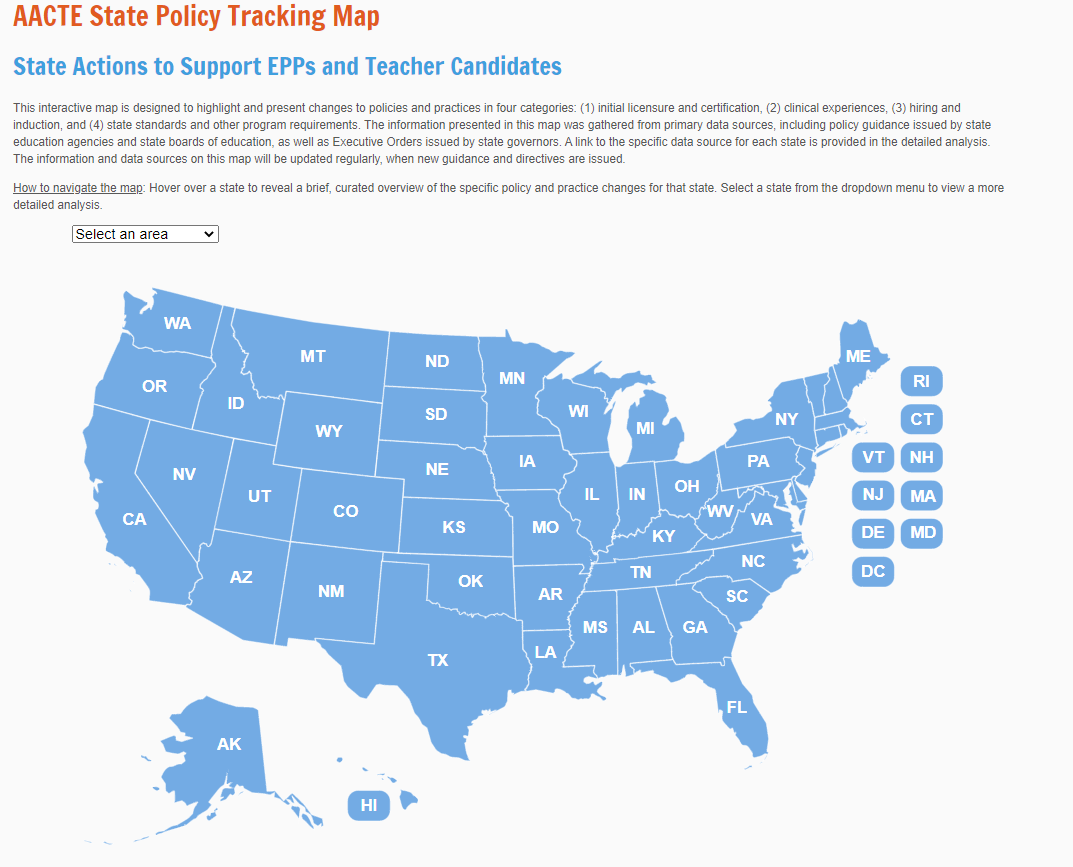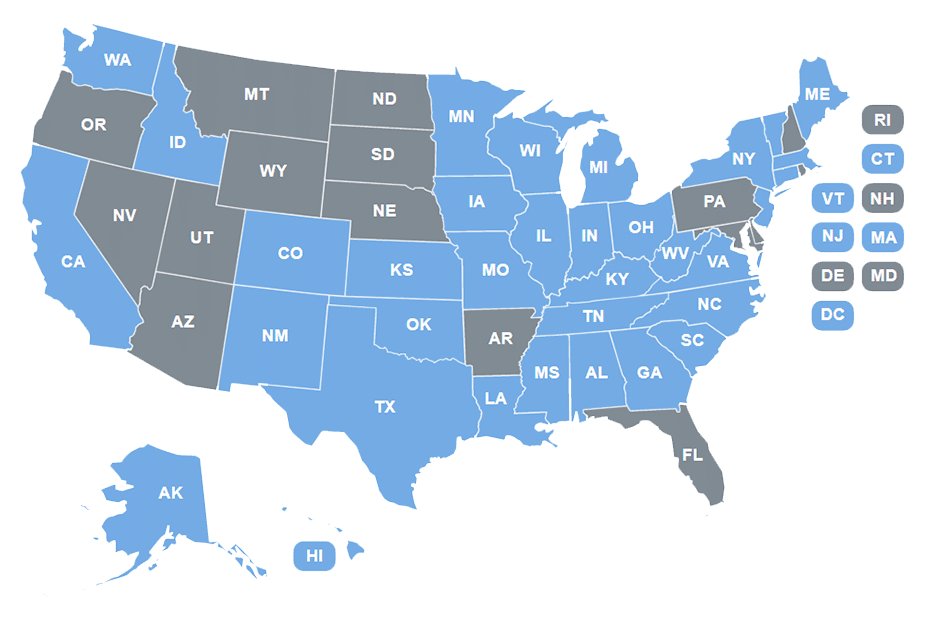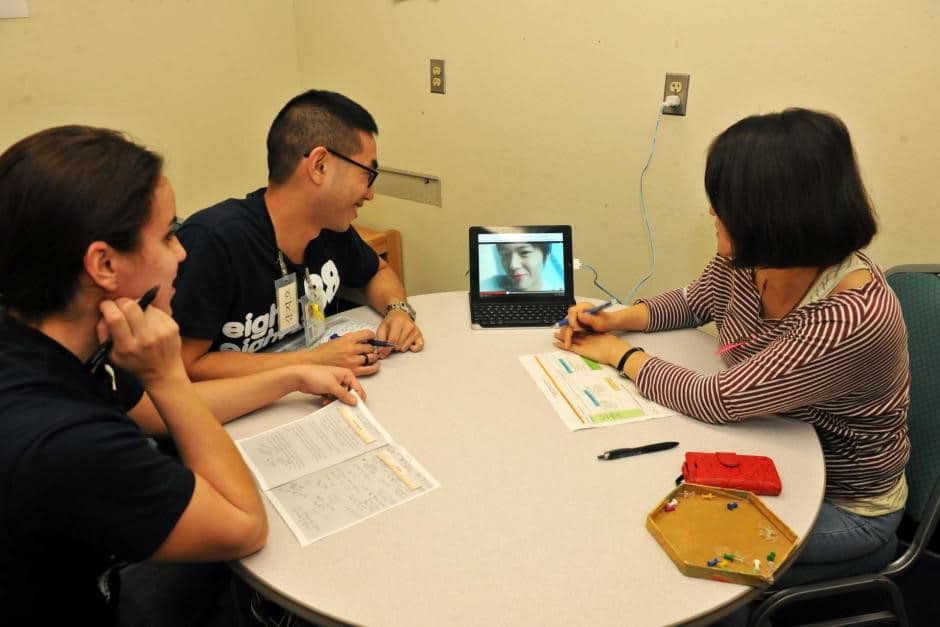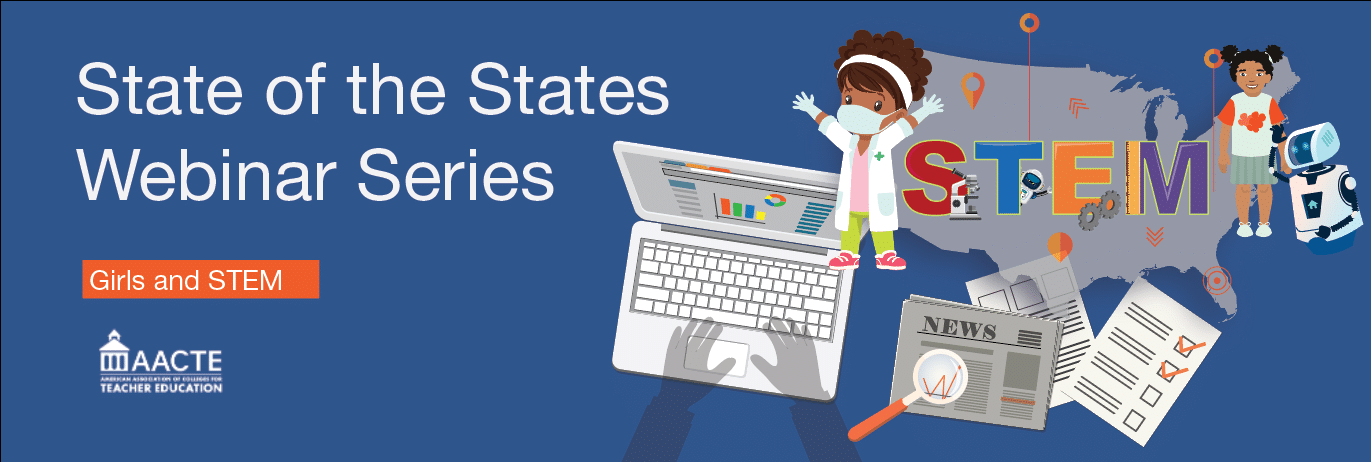22 Sep2020
By AACTE

Teamwork Team Collaboration Connection Togetherness Unity Concept
Today AACTE released its new report, Teaching in the Time of COVID-19: State Recommendations for Educator Preparation Programs and New Teachers. The 10 recommendations address critical state policy changes necessary to support innovative improvement in education during the global pandemic and beyond. Increased barriers to developing the educator workforce during the health crisis, coupled with the national teacher shortage, create demands for acute collaboration between educator preparation programs (EPPs), state education agencies, and PK-12 schools to reinvent systems for producing high-quality teachers to meet the growing needs of diverse learners.
AACTE reviewed and analyzed COVID-related state guidance to EPPs in pursuit of three goals: (1) to understand what states are doing to help prepare teachers for the classroom during this crisis, (2) to understand any extant trends in state guidance and (3), to identify recommendations for state leaders to enhance the support of new teachers impacted by program and policy disturbances stemming from the coronavirus crisis. From the analysis emerged recommendations that address changes to licensure and certification requirements, clinical experience pathways, and induction supports for novice teachers.
“Navigating the current crisis is complicated, to say the least, and the pandemic’s impact has a profound effect on many, including colleges of education and educator preparation programs,” said Lynn M. Gangone, Ed.D., AACTE president and CEO. “The circumstances of the pandemic open a window to think differently about our collective work. AACTE released this report at its State Leaders Institute today to provide our state chapter leaders with the latest research to inform their collaborations and conversations with state officials, PK-12 partners, and legislators.”
The report’s 10 recommendations are:
- In making licensure and certification waivers for teachers, states should make changes that are directly necessary because of the pandemic temporary, with a timeline for an ending that is clearly delineated, and transparent in that those who are granted certification as a result of waived requirements must be so classified, (e.g., “waiver-certification”).
- States should seek innovative opportunities to address ongoing challenges—such as lack of diversity in the profession and the need to modernize the processes of licensure and certification—as they consider licensure and certification revisions.
- Ensure candidates continue gaining experience teaching in a clinical setting with a mentor teacher, university supervisor, and continuous feedback.
- Encourage flexibility and collaboration between EPPs and school districts that ensure teacher candidates participate in clinical experiences online or in distance settings if PK-12 schools are not physically back in brick and mortar buildings.
- Encourage innovative approaches to clinical experiences including distributed learning models that employ team teaching in PK-12 settings, simulated classroom environments that allow candidates to approximate teaching, and financially supporting candidates through employment with the local school.
- Assess the needs of new teachers impacted by COVID-19 and identify areas for additional support.
- Require an induction action plan for new teachers describing the activities that must be completed or acquired for successful induction.
- Establish a mentorship program to equip new teachers with strategies to deliver high-quality instruction to diverse learners.
- Implement co-teaching for new teachers whose clinical experiences were fully or partially waived and teachers who have not passed exams for licensure and certification due to COVID-19.
- Partner with EPPs to provide professional development to ensure that new teachers possess the knowledge, skills, and dispositions to teach diverse students.
View the full report at AACTE’s website.
10 Sep2020
By Jerrica Thurman

Only one week is left to register for the 2020 State Leaders Institute, September 22-23! Register by 12:00 midnight on Friday, September 18 to experience AACTE’s inaugural, virtual event for state leaders.
During this signature event, centered around promoting diversity, equity and inclusion in education, state leaders will focus on capacity building and augmenting their chapter’s impact through leadership development. Attendees will learn effective skills to engage with their governor’s office, strengthen the advocacy capacity of their state chapter and its membership, and enjoy networking opportunities with peers.
Here’s what attendees from past events had to say about the value of the State Leaders Institute:
20 Aug2020
By Ward Cummings

This year’s virtual AACTE State Leaders Institute will take place September 22-23, and will bring together state chapter leaders from AACTE and the Association of Teacher Educators (ATE) to enhance the presence of educator preparation at the state level. During this AACTE signature event, state leaders will focus on capacity building and augmenting their chapter’s impact through leadership development. Attendees will learn effective skills to engage with their governor’s office, receive the latest tips to strengthen the advocacy capacity of their state chapter and its membership, and enjoy networking opportunities with peers.
17 Jul2020
By Linda Minor
 AACTE is excited to offer its virtual 2020 Washington Week experience this September. The event dates have changed to offer you more opportunities to participate. Here’s the lineup:
AACTE is excited to offer its virtual 2020 Washington Week experience this September. The event dates have changed to offer you more opportunities to participate. Here’s the lineup:
Holmes Advanced Policy Course: September 2-3
On September 2, attendees will learn what to expect during the event and hear from a keynote speaker. The September 3 activities will include interactive breakout sessions and a congressional panel.
Holmes Policy Institute: September 8-10
On September 8, attendees will participate in a welcome session and engaging breakouts. Keynote speakers and panelists will show participants how to advocate for educator preparation through lively discussions and group activities. On September 10, participants will enjoy a virtual reception, including interactive games, to conclude the event.
Day on the Hill: September 9-10 and September 15-16
02 Jul2020
By Ward Cummings
 AACTE is excited to introduce its short tutorial video on how to navigate the new State Policy Tracking Map recently added to the AACTE COVID-19 Resource Hub. The easy to use map provides an analysis of state-issued guidance impacting standards and practice, new teacher induction, clinical practice and licensure. The tutorial offers a walkthrough of how to access and use the information provided in three formats: short bullet points, short-form distillations, and links to the original source material.
AACTE is excited to introduce its short tutorial video on how to navigate the new State Policy Tracking Map recently added to the AACTE COVID-19 Resource Hub. The easy to use map provides an analysis of state-issued guidance impacting standards and practice, new teacher induction, clinical practice and licensure. The tutorial offers a walkthrough of how to access and use the information provided in three formats: short bullet points, short-form distillations, and links to the original source material.
AACTE is among the first education associations to track and publish this information, which was collected from multiple sources: news reports, state press releases, executive orders issued by state governors and statements issued by state departments of education. AACTE also included information from state chapter leaders who participated in the shaping of EPP guidance in their state. As state legislatures begin to convene and engage on this issue, we will update the map to reflect their work.
The AACTE National Office has begun to analyze the information collected for the map and is compiling its findings in a soon-to-be released report. Teaching in the Time of COVID: State Recommendations for Preparation and New Teachers will summarize changes by EPPs in response to the COVID-19 public health crisis, seek opportunities for improvement, and propose recommendations to manage the pandemic successfully.
In the meantime, AACTE encourages you to visit the State Policy Tracking Map and invites you to share any questions, concerns, or updates you may have regarding the information presented on the map.
26 May2020
AACTE Responds to COVID-19
By Ward Cummings
 As part of its continued efforts to inform members about the latest developments regarding educator preparation programs (EPPs) in light of COVID-19, AACTE has updated its Policy Tracker Map to reflect recent changes in EPP-specific state guidance and recommendations. These changes include guidance analysis of 12 new states, specifically Arkansas, Delaware, Florida, Maryland, New Hampshire, Rhode Island, Pennsylvania, Arizona, Nevada, South Dakota, North Dakota, and Wyoming. We have also updated data for New Jersey, which recently issued new guidance waiving edTPA.
As part of its continued efforts to inform members about the latest developments regarding educator preparation programs (EPPs) in light of COVID-19, AACTE has updated its Policy Tracker Map to reflect recent changes in EPP-specific state guidance and recommendations. These changes include guidance analysis of 12 new states, specifically Arkansas, Delaware, Florida, Maryland, New Hampshire, Rhode Island, Pennsylvania, Arizona, Nevada, South Dakota, North Dakota, and Wyoming. We have also updated data for New Jersey, which recently issued new guidance waiving edTPA.
In the coming weeks and months, as agency guidance is supplemented by the supporting instructions and recommendations of other state entities, such as the legislature and regulatory bodies, the information and features of this interactive map will grow to accommodate those developments.
21 May2020
Experts discuss emergency waivers and their potential impact
By Stacia Cedillo
This article originally appeared on the Education Writers Association website and is reprinted with permission.

Each year, hundreds of thousands of new teachers are licensed in the United States. With the shuttering of schools and colleges due to the coronavirus pandemic, states are using emergency waivers to certify teacher candidates who are unable to complete preparation requirements such as coursework, student teaching, and certification exams.
Along with these swift changes come new questions about the teacher workforce and what will happen to the educator pipeline in the midst of a public health emergency and economic recession.
11 May2020
By Ward Cummings

Due to the effects of COVID-19, many states have issued guidance or directives to assist educator preparation programs (EPPs) and teacher candidates in their response to the associated academic challenges and interruptions. In an effort to track relevant changes in state policies and practices, AACTE has developed a new interactive map designed to highlight and present such changes, with a focus on four key categories:
- initial licensure and certification
- clinical experiences
- hiring and induction
- state standards and other program requirements
28 Apr2020
By Diana Lambert

This article originally appeared on EdSource and is reprinted with permission.
The coronavirus pandemic won’t prevent most teacher candidates from moving into California classrooms next school year, even if they have yet to complete all the normally required student teaching hours or certification tests.
The California Commission on Teacher Credentialing voted Thursday to give university teacher preparation programs wide latitude to decide when teacher candidates are prepared to move onto the classroom. The commission made its decision during a virtual meeting attended by more than 550 viewers. It affects students who are on track to complete their coursework between March 19 and Sept. 1.
California expects 26,000 teachers, principals and other administrators, speech-language pathologists and school psychologists, counselors, social workers, nurses and librarians to graduate this school year, according to the commission. The majority are studying to get their teaching credential.
20 Mar2020
AACTE Responds to COVID-19
By Ward Cummings
A series of unprecedented events are forcing states across the country to close schools and universities. As school leaders scramble to identify pathways and strategies to protect the health of students and staff, many of them must also attend to the unique challenges of their teaching students who are in limbo because of the coronavirus crisis.
Many states have not yet provided guidance to schools of education on how to lead and advise this special class of students. As a result, many teacher candidates are waiting to learn how, or even if, they will be able to fulfill the requirements of their programs and graduate. Given the unparalleled nature of events, it is understandable if some states are not fully prepared to address this specific concern, but there are a few notable exceptions. In the absence of legislative guidance, states like California, Kentucky, Iowa, and South Carolina have instructively addressed the most pressing concerns pertaining to teacher preparation in their states.
The California Commission on Teacher Credentialing maintains and up-to-date webpage where they attempt to answer the most common questions from educators and employing agencies regarding credentialing requirements, policies, and application procedures. The Commission is particularly concerned about candidates’ ability to complete clinical practice and performance assessment requirements during this academic year, and is looking for ways to mitigate this situation. It has prepared a memo to help guide the decision-making by deans and directors of education on the subject.
06 Mar2020
By Linda Minor

Registration is now open for AACTE’s 2020 Washington Week. This annual event, with participation from AACTE and the Association of Teacher Educators (ATE) state chapter leaders, Holmes Scholars, and AACTE members and non-members alike interested in advocating for the profession, will take place in the nation’s capital. This year’s Washington Week will be held May 31 – June 3 at the Renaissance Arlington Capital View Hotel in Arlington, VA, and on Capitol Hill.
06 Feb2020
By Ward Cummings
 While many people are focused on the fact that 2020 is a presidential election year, it is important to note that much is happening at the state level. There are 11 gubernatorial races, all but 6 states have legislative elections, and there are many other measures that might require your vote. Where do you gather objective, non-partisan information about what will be on your ballot? Consider Ballotpedia, a digital encyclopedia of American politics. It is run by a nonprofit that is dedicated to compiling thorough, non-partisan information regarding state by state election/ballot activity in the United States.
While many people are focused on the fact that 2020 is a presidential election year, it is important to note that much is happening at the state level. There are 11 gubernatorial races, all but 6 states have legislative elections, and there are many other measures that might require your vote. Where do you gather objective, non-partisan information about what will be on your ballot? Consider Ballotpedia, a digital encyclopedia of American politics. It is run by a nonprofit that is dedicated to compiling thorough, non-partisan information regarding state by state election/ballot activity in the United States.
Ballotpedia gathers information to support you in engaging in your democracy including:
- Databases of all upcoming elections, searchable by street address
- Dates for all elections and candidates, including off-year and special elections
- Times for Poll Openings and Closings organized by state
- Bios and contact information for all elected officials by district, down to the judicial and school board level, searchable by zip-code
- Databases of all upcoming state ballot measures, searchable by zip-code
- Fact-Checking of political reporting regarding issues under deep debate in your state
10 Jan2020
By Ward Cummings

The subject of this month’s State of the States webinar is Girls and STEM. In 2009, four university researchers explored their suspicion that girls’ lagging behind boys in math achievement was substantially influenced by the math anxieties of their female elementary school teachers. The result of their research showed their suspicions to be correct and that some of the achievement gap was indeed a result of female teachers’ own apprehensions about math and their personal biases about the abilities of female students. The researchers found that female students can pick up on and even absorb negative thoughts from their teachers as early as kindergarten. Learn more.
Since that study was conducted, the achievement gap in math between boys and girls has narrowed, but still persists. The webinar will focus on what states are doing legislatively, with programs and with policy to eradicate the STEM achievement gap.
Register now for this members-only webinar:
State of the States: Girls and Stem
Wednesday, January 22
10:00 a.m. ET
02 Jan2020
By Amelia Vance

Since 2013, over 130 new student privacy laws have passed in 41 states, with more bills and regulations being rolled out each year that include many new requirements for educators and administrators to implement. Some state laws include the threat of jail or large fines when school staff even unintentionally violate student privacy. Unfortunately, few states have received funding or support in implementing these new laws.
This massive shift in the legal landscape makes it hard for schools and districts to keep up. This isn’t only a legal problem. As technology changes and the amount of information schools collect and maintain increases, ensuring that new educators and administrators come into their schools with the skills needed to adequately protect student privacy in their day-to-day work is extremely challenging.
27 Nov2019
By J.C. Bowman
 This article originally appeared in the Chatanoogan.com and is reprinted with permission.
This article originally appeared in the Chatanoogan.com and is reprinted with permission.
As educators, we are concerned about the quality and quantity of applicants entering the field of education. Our members have often been catalysts for innovative solutions to the many challenges facing education. This is why we take an interest in the next generation of educators and why we strive to improve their experience and support as they transition from teacher candidate to classroom teacher.
In 1986, education school deans from the top universities developed a critical report that attributed much of the blame for struggling public schools on the training teachers were receiving in college.
Research reminds us that although we spend millions of dollars and thousands of hours on teacher preparation courses, we do not have much evidence justifying some of those requirements in Colleges of Education. Nor do policymakers really know how to measure and define a successful teacher training program.










 AACTE is excited to offer its virtual
AACTE is excited to offer its virtual  AACTE is excited to introduce its short
AACTE is excited to introduce its short  As part of its continued efforts to inform members about the latest developments regarding educator preparation programs (EPPs) in light of COVID-19, AACTE has updated its
As part of its continued efforts to inform members about the latest developments regarding educator preparation programs (EPPs) in light of COVID-19, AACTE has updated its 


 While many people are focused on the fact that 2020 is a presidential election year, it is important to note that much is happening at the state level. There are 11 gubernatorial races, all but 6 states have legislative elections, and there are many other measures that might require your vote. Where do you gather objective, non-partisan information about what will be on your ballot? Consider
While many people are focused on the fact that 2020 is a presidential election year, it is important to note that much is happening at the state level. There are 11 gubernatorial races, all but 6 states have legislative elections, and there are many other measures that might require your vote. Where do you gather objective, non-partisan information about what will be on your ballot? Consider 

 This article originally appeared in the
This article originally appeared in the